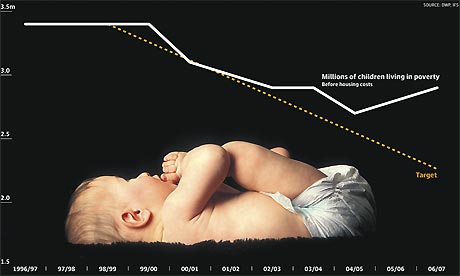Up. Up. Up. Child poverty, pensioner poverty, inequality
Gap between richest and poorest families wider despite government efforts
- The Guardian,
- Wednesday June 11 2008
- Article history

Gordon Brown's flagship anti-poverty campaign received a triple blow yesterday with news that a rise in both child and pensioner poverty had left Britain a more unequal country than when Labour came to power in 1997.
Ministers were last night putting a brave face on figures showing a widening gap between the richest and poorest families and a second successive 100,000 jump in the number of children living below the government's poverty threshold. They said extra money pledged to help the young and the elderly in this year's budget underlined the commitment to meet Tony Blair's 1999 pledge to eradicate child poverty by 2020 and halve it by 2010.
Britain's leading tax experts - the Institute for Fiscal Studies (IFS) - said that despite the billions of pounds spent on tax credits, Labour had yet to meet its 2005 benchmark of reducing child poverty by a quarter and that the prime minister would have to divert money from middle-class tax cuts to have an even chance of hitting the 2010 target.
Treasury sources admitted that finding the necessary £2.8bn - equivalent to the one-off package to end the 10p tax row - every year would prove challenging at a time when the state's finances are already deeply in the red.
David Phillips, researcher at the IFS, said: "Further increases in poverty and inequality will not be welcome news to the government, even though they should come as no surprise. We estimate that it would need to spend a further £2.8bn a year by 2010-11 to give itself a 50-50 chance of meeting its next child poverty target. But the chancellor will be under pressure to spend the same amount renewing last month's 'one off' income tax cut, most of which benefits families on middle incomes rather than the poor."
Data from the Department for Work and Pensions (DWP) showed that the strong economic growth early in Labour's third term failed to help the least well-off. On the day that Sir Callum McCarthy, chairman of the Financial Services Authority, said the City's watchdog would analyse pay structures of investment banks and potentially penalise those with schemes skewed towards excessive risk-taking, the DWP figures showed the incomes of the poorest 20% of households fell by 1.6% between 2005-06 and 2006-07 while those of the richest households rose by 0.8%.
Official figures show that the growing importance of the City to the economy has resulted in the slice of national income going to the richest fifth of households rising from 40.9% to 42.6% since 1997 while the share taken by the poorest families has dropped from 7.7% to 7.2%.
The IFS said inequality in Britain was equal to its highest level since figures were available in 1961, but James Purnell, the work and pensions secretary, said that in the absence of Labour's heavy investment, poverty would have been even higher. "Had the government done nothing other than simply uprate the tax and benefit system, we estimate there would have been 1.7 million more children and 1.5 million more pensioners in poverty today."
Purnell added that child poverty - defined as a young person living in a household on less than 60% of median income - had been cut by 600,000 since Labour came to power, while relative pensioner poverty was down by 900,000.
Help the Aged said, however, that the 300,000 increase in pensioner poverty in 2006-07 was a "disgrace". Mervyn Kohler, special adviser for the charity, said: "The government should be mortified by the latest rise. When older people live on a fixed income it is virtually impossible for them to pull themselves out of poverty. Pensioners often have to cut back on essential household items just to survive."
Together with economic stability, tackling poverty has been central to Brown's political project both in his 10 years as chancellor and since taking over from Blair as prime minister a year ago. Opposition parties said last night that the latest figures were evidence of failure.
The shadow work and pensions secretary Chris Grayling said the figures showed the government had "run out of steam".
He added: "Tackling child and pensioner poverty has been central to their strategy and one where Gordon Brown has boasted again and again about the difference they are making.
"The truth is very different. Their target of halving child poverty by 2010 looks totally unattainable and it is the children being brought up in some of our most deprived areas who will pay the price.
The Liberal Democrat work and pensions spokeswoman Jenny Willott said: "The rise in child poverty for the second year running is a damning indictment of Labour and raises serious questions about the government's spending priorities.
"It is impossible to understand why, as one of the wealthiest countries in the world, Britain should have one in five of its children living in poverty. The target of halving child poverty by 2010 is looking increasingly unachievable, and ministers must act quickly to regain momentum."

No comments:
Post a Comment